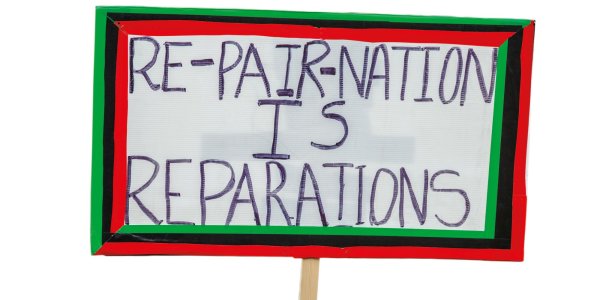Last week, the Commonwealth Heads of Government (CHOGM) summit in Samoa amplified growing calls for the United Kingdom to engage in meaningful discussions on reparations for countries impacted by slavery and colonialism.
Despite the UK ruling out reparations from the official agenda, the demand from descendants of enslaved people and nations harmed by colonialism remains loud and clear. The word ‘reparations’ comes from the Latin reparare, meaning to repair. Reparations are not just about addressing historic wrongs; they are about repairing the lasting inequalities inflicted over centuries.
As the UK considers its role in international development, reparations offer a justice-driven alternative to traditional ‘aid’. By acknowledging the centuries of harm caused by the extraction of resources in different forms from colonised nations, the UK can begin to repair the injustices that have enriched it at the expense of others. This is not about charity; it’s about fairness and redress for the immense economic, ecological and societal damage inflicted by colonialism.
“Our country has a moral and legal duty to address past injustices like slavery and colonialism”
Between 1765 and 1938, Britain extracted approximately £9tn (adjusted for inflation) from India alone through taxation and resource exploitation. This drain of wealth underpinned Britain’s industrialisation and economic dominance, while leaving colonised nations impoverished. Such staggering figures dwarf the UK’s overseas aid budget (£15.4bn in 2023).
But the harm wasn’t solely financial. Colonialism devastated ecosystems, displaced communities, and inflicted political and psychological damage that endures to this day. Reparations would acknowledge this exploitation as a debt owed, not a gesture of charity, and start to pave a new way forward.
The issue of reparations is about more than just handing over money – it’s about addressing the structural inequalities that colonialism created and still perpetuates. These disparities are starkly evident in the fight against climate change. Worsening droughts in East Africa, and tropical hurricanes in the Caribbean, show how former colonies remain disproportionately vulnerable to the front-line effects of a crisis they did little to cause. As a leading historic emitter, the UK could take responsibility by framing reparations within the context of climate justice. Reparations could fund large-scale restoration projects, compensate for biodiversity loss, and help nations adapt to climate change without the burden of debt.
For the UK to make genuine progress toward reparations, it must first confront its colonial legacy and the ongoing mechanisms that legitimise it. This requires moving beyond feelings of guilt and towards engaging in open, truthful dialogue about how colonialism has entrenched global and domestic inequality. It also means examining the UK’s influence within powerful decision making bodies like the G7 and the UN Security Council, and how that influence can be used to promote or erode global justice. These bodies often perpetuate the very inequalities that reparations seek to address by prioritising the interests of high-income countries.
A full programme of reparative justice would cover and account for compensation, cultural returns, restoration of dignity, and reconnection for a shared future. The UK can transition from traditional aid to reparations by addressing the racism and structural inequalities that manifest in global governance, trade and tax systems that continue to disadvantage lower-income countries. Aid may alleviate short-term suffering, but it does not address the structural drivers of inequality, many of which are inseparable from colonialism and racial hierarchies. A genuine commitment to reparations would help tackle the root causes of poverty and climate vulnerability while restoring dignity and agency to communities formerly oppressed by colonialism.
Our country has a moral and legal duty to address past injustices like slavery and colonialism. Failing to engage with the case for reparations shows a disregard for the nations and individuals who live with their enduring impact. The UK should instead lead by example, embracing reparations as a means of tackling the root causes of climate breakdown and structural inequality, rectifying our colonial legacy, and building a fairer, more equal world.
Bell Ribeiro-Addy
Labour MP for Clapham and Brixton Hill

